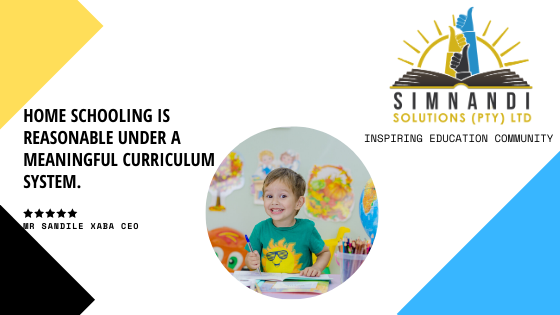In South Africa, home-schooling is defined as an alternative to school attendance that consists of a purposeful programme of education that is directed and supervised by the parent, primarily at home, and which may include other forms of educational support. This programme must meet the requirements for registration, as detailed in section 51 of the Schools Act – 84 of 1996 (Department of Basic Education, 2018). In other words, home schooling simply means that a child is undergoing his/her school career at home. The curriculum the child undertakes is the same curriculum undertaken by learners in schools. The examinations are similar. This brings a concern of how meaningful home schooling process may be then whilst a child is still forced to undertake an unfavourable curriculum that is forced upon learners attending schools? In short, the South African education authorities only give a child liberty to study at home yet still stuck with irrelevant subject towards the child`s life aspirations.
Home-schooling began as an expression of rejection of the values of mainstream society (Gaither, 2008). Both conservative and liberal families began home schooling in the late 1970s and the 1980s. The conservative groups felt that the education provided by public schools was too liberal, and would expose their children to secular, ‘anti-Christian’ values, while liberal parents believed that the same education was too conservative and that their children were being forced to fit into a mould, rather than being given personal autonomy. Christian parents began to feel uneasy at the changes implemented in the school curriculum, such as the re-introduction of the study of evolution. They felt that their children were no longer being taught in accordance with their beliefs. The American government’s decision to remove bible reading and Christian prayer from the routine of a school day was the proverbial ‘last straw’ and a catalyst for the migration of Christian families from the public-school system to home schooling (Krause, 2012).
The black highlighted part above symbolises the parents` dissatisfaction towards education provided at the time. The words ‘’personal autonomy’’ simply echoes the concept of personalized education curriculum system (PECS). This is a proof that the call for education to be designed to meet the unique educational needs and traits of an individual child is not new, perhaps it was just not well conceptualized as we have now.
The Department of basic education posit that the lessons you offer your child must fall within the scope of the following compulsory phases of education: foundation phase (grades 1-3), intermediate phase (grades 4-6), senior phase (grades 7-9). This simply means that the child is still forced to choose from a range of subjects (curriculum) that constitutes the subject a learner may not be interested in. The argument here is: since south African home schooling registration requirements does not allow subjects outside those promulgated by the department, it means that the child is still stuck within the same system like all other children. The child still undertakes subjects that serve no meaning for his/her future since the lessons you offer your children should fall within the scope of NCS Curriculum requirements. Therefore, home schooling does not solve the curriculum problem learners and parents are faced with. In short, even though a child may be home schooled, the National Curriculum Statement (NCS) still imposes its compulsory sets of subjects upon a child.
Home schooling would be meaningful under Personalized Education Curriculum System (PECS). This is because PECS is already an individualistic and selectively personalized curriculum designed for personal and individual traits of each and every child. Home schooling, with such a curriculum would therefore be meaningful and less strenuous to execute as the child would be dealing with a set of subjects that are meaningful and relevant to his/her life aspirations.
One would think that home schooling provides you with curriculum freedom of choosing from a set of subjects relevant and appealing to your child, the fact is, that is not the case! Home schooling under NCS only benefit the child with liberty to study at home in a more comfortable and uncrowded environment. As for curriculum freedom, it remains a struggle and a frustrating issue at times as children are prisoners of an unwanted curriculum. Amongst the reasons parents opt for home schooling their children is because of curriculum dissatisfaction, meaning that they want out of the curriculum system for a better one. In south Africa, you can’t escape the operating curriculum (NCS), you are stuck with it whether at school or at home. Personalized Education Curriculum System (PECS) remains the only hope for South African education community.


